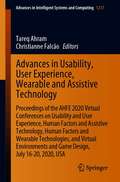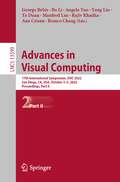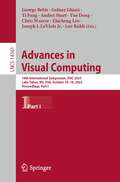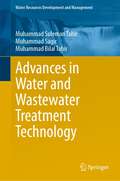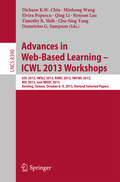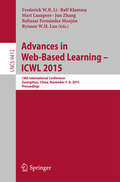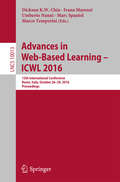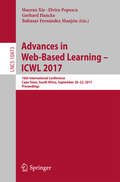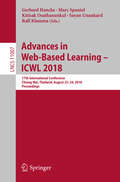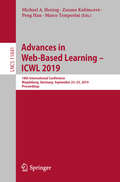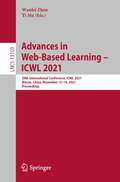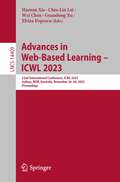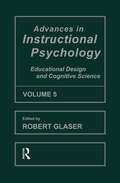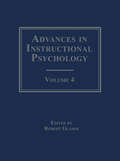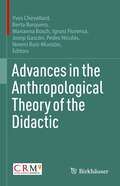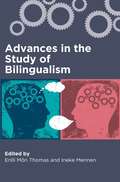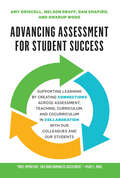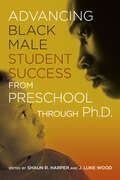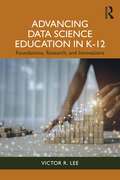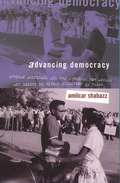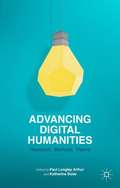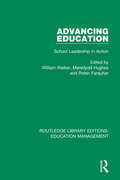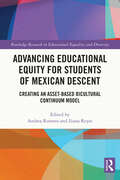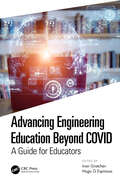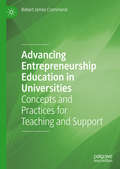- Table View
- List View
Advances in Usability, User Experience, Wearable and Assistive Technology: Proceedings of the AHFE 2020 Virtual Conferences on Usability and User Experience, Human Factors and Assistive Technology, Human Factors and Wearable Technologies, and Virtual Environments and Game Design, July 16-20, 2020, USA (Advances in Intelligent Systems and Computing #1217)
by Tareq Ahram Christianne FalcãoThis book addresses emerging issues in usability, interface design, human–computer interaction, user experience and assistive technology. It highlights research aimed at understanding human interactions with products, services and systems and focuses on finding effective approaches for improving the user experience. It also discusses key issues in designing and providing assistive devices and services for individuals with disabilities or impairment, offering them support with mobility, communication, positioning, environmental control and daily living. The book covers modeling as well as innovative design concepts, with a special emphasis on user-centered design, and design for specific populations, particularly the elderly. Further topics include virtual reality, digital environments, gaming, heuristic evaluation and forms of device interface feedback (e.g. visual and haptic). Based on the AHFE 2020 Virtual Conference on Usability and User Experience, the AHFE 2020 Virtual Conference on Human Factors and Assistive Technology, the AHFE Virtual Conference on Human Factors and Wearable Technologies, and the AHFE 2020 Virtual Conference on Virtual Environments and Game Design, held on July 16–20, 2020, it provides academics and professionals with an extensive source of information and a timely guide to tools, applications and future challenges in these fields.
Advances in Visual Computing: 17th International Symposium, ISVC 2022, San Diego, CA, USA, October 3–5, 2022, Proceedings, Part II (Lecture Notes in Computer Science #13599)
by Yang Liu George Bebis Bo Li Manfred Lau Angela Yao Ye Duan Rajiv Khadka Ana Crisan Remco ChangThis two-volume set of LNCS 13598 and 13599 constitutes the refereed proceedings of the 17th International Symposium on Visual Computing, ISVC 2022, which was held in October 2022. The 61 papers presented in these volumes were carefully reviewed and selected from 110 submissions. They are organized in the following topical sections: Part I: deep learning I; visualization; object detection and recognition; deep learning II; video analysis and event recognition; computer graphics; ST: biomedical imaging techniques for cancer detection, diagnosis and management.Part II: ST: neuro-inspired artificia intelligence; applications; segmentation and tracking; virtual reality; poster.
Advances in Visual Computing: 18th International Symposium, ISVC 2023, Lake Tahoe, NV, USA, October 16–18, 2023, Proceedings, Part I (Lecture Notes in Computer Science #14361)
by Yue Dong George Bebis Luv Kohli Joseph J. LaViola Jr. Yi Fang Golnaz Ghiasi Andrei Sharf Chris Weaver Zhicheng LeoThis volume LNCS 14361 and 14362 constitutes the refereed proceedings of the, 16th International Symposium, ISVC 2023, in October 2023, held at Lake Tahoe, NV, USA.The 42 full papers and 13 poster papers were carefully reviewed and selected from 120 submissions. A total of 25 papers were also accepted for oral presentation in special tracks from 34 submissions. The following topical sections followed as:Part 1: ST: Biomedical Image Analysis Techniques for Cancer Detection, Diagnosis and Management; Visualization; Video Analysis and Event Recognition; ST: Innovations in Computer Vision & Machine Learning for Critical & Civil Infrastructures; ST: Generalization in Visual Machine Learning; Computer Graphics; Medical Image Analysis; Biometrics; Autonomous Anomaly Detection in Images; ST: Artificial Intelligence in Aerial and Orbital Imagery; ST: Data Gathering, Curation, and Generation for Computer Vision and Robotics in Precision Agriculture.Part 2: Virtual Reality; Segmentation; Applications; Object Detection and Recognition; Deep Learning; Poster.
Advances in Water and Wastewater Treatment Technology (Water Resources Development and Management)
by Muhammad Sagir Muhammad Bilal Tahir Muhammad Suleman TahirThis book highlights the several pollutants and their derivatives that exist in water and wastewater, such as pharmaceuticals, antibiotics, personal care products, heavy metals, pesticides, dyes etc., as a result of rapid urbanization and industrialization. Several part pollution is caused by nutrients, organics, and contaminants with low concentration but is highly toxic to human and aquatic environment. This book provides a holistic approach in terms of measurement, monitoring, and recent advances in treatment technologies for water and wastewater treatment and water reuse. The technologies involve the physio-chemical, biological and advanced oxidation processes in which they are modified or coupled with nanomaterials and/or newly developed products for improving the performance of the current treatment processes. In addition, the membrane processes include recent research on the removal of challenging chemicals by various membrane bioreactors and reverse osmosis processes.
Advances in Web-Based Learning - ICWL 2013 Workshops: USL 2013, IWSLL 2013, KMEL 2013, IWCWL 2013, WIL 2013, and IWEEC 2013, Kenting, Taiwan, October 6-9, 2013, Revised Selected Papers (Lecture Notes in Computer Science #8390)
by Demetrios G. Sampson Qing Li Dickson K. W. Chiu Elvira Popescu Minhong Wang Rynson Lau Timothy K. Shih Chu-Sing YangThis book constitutes the refereed proceedings of the Workshops held at the ICWL 2013 International Conference on Web Based Learning in Kenting, Taiwan, in October 2013. The 29 papers presented were carefully reviewed and selected for inclusion in this volume. They were held at the following workshops: First International Workshop on Ubiquitous Social Learning, USL 2013; 2013 International Workshop on Smart Living and Learning, IWSLL 2013; Third International Symposium on Knowledge Management and e-Learning, KMEL 2013; 2013 International Workshop on Cloud Computing for Web-Based Learning, IWCL 2013; 2013 International Workshop on Web Intelligence and Learning; WIL 2013; and the 2013 International Workshop on e-book and Education Cloud, IWEEC 2013.
Advances in Web-Based Learning -- ICWL 2015: 14th International Conference, Guangzhou, China, November 5-8, 2015, Proceedings (Lecture Notes in Computer Science #9412)
by Jun Zhang Frederick W.B. Li Ralf Klamma Mart Laanpere Baltasar Fernández Manjón Rynson W.H. LauThis book constitutes the refereed proceedings of the 14th International Conference on Web-Based Learning, ICWL 2015, held in Guangzhou, China, in Noavember 2015. The 18 revised full papers presented together with 2 invited papers and 7 short papers were carefully reviewed and selected from about 79 submissions. The papers are organized in topical sections on collaborative and peer learning; e-lerning platform and tolls; design, model, and framework of e-learning systems; intelligent tutoring and tools; pedagogical issues; personalized and adaptive learning; and Web 2. 0 and social learning environments.
Advances in Web-Based Learning – ICWL 2016: 15th International Conference, Rome, Italy, October 26–29, 2016, Proceedings (Lecture Notes in Computer Science #10013)
by Dickson K.W. Chiu Ivana Marenzi Umberto Nanni Marc Spaniol Marco TemperiniThis book constitutes the refereed proceedings of the 15th International Conference on Web-Based Learning, ICWL 2016, held in Rome, Italy, in October 2016. The 19 revised full papers presented together with 10 short papers and 4 poster papers were carefully reviewed and selected from 110 submissions. The papers are organized in topical sections on design for learning; education and teaching; massive open online courses; mobile learning; modeling for learning; serious games; social-collaborative learning; and support for learning.
Advances in Web-Based Learning – ICWL 2017: 16th International Conference, Cape Town, South Africa, September 20-22, 2017, Proceedings (Lecture Notes in Computer Science #10473)
by Baltasar Fernández Manjón Elvira Popescu Haoran Xie Gerhard HanckeThis book constitutes the proceedings of the 16th International Conference on Web-Based Learning, ICWL 2017, held in Cape Town, South Africa, in September 2017. The 13 revised full papers presented together with 9 short papers and 3 poster papers were carefully reviewed and selected from 56 submissions. The papers are organized in topical sections on Inquiry-Based Learning and Gamification; Learning Analytics; Social Media and Web 2. 0-based Learning Environments; Assessment and Accessibility in Higher Education; Open Educational Resources and Recommender Systems; and Practice and Experience Sharing.
Advances in Web-Based Learning – ICWL 2018: 17th International Conference, Chiang Mai, Thailand, August 22-24, 2018, Proceedings (Lecture Notes in Computer Science #11007)
by Ralf Klamma Marc Spaniol Gerhard Hancke Kitisak Osathanunkul Sayan UnankardThis book constitutes the proceedings of the 17th International Conference on Web-Based Learning, ICWL 2018, held in Chiang Mai, Thailand, in August 2018.The 11 revised full papers presented together with 4 short papers were carefully reviewed and selected from 37 submissions. The papers are organized in topical sections on learning assessment and behavior; case studies; augmented reality and collaborative learning; game-based learning; and learning content management and experience sharing.
Advances in Web-Based Learning – ICWL 2019: 18th International Conference, Magdeburg, Germany, September 23–25, 2019, Proceedings (Lecture Notes in Computer Science #11841)
by Marco Temperini Michael A. Herzog Zuzana Kubincová Peng HanThis book constitutes the proceedings of the 18th International Conference on Advances in Web-Based Learning, ICWL 2019, held in Magdeburg, Germany, in September 2019. The 15 full, 15 short, and 7 poster papers presented in this volume were carefully reviewed and selected from 68 submissions. The contributions were organized in topical sections named: Semantic Web for E-Learning, Learning Analytics, Computer Supported Collaborative Learning, Assessment and Pedagogical Issues, E-learning Platforms and Tools, Mobile Learning, and Poster Papers.
Advances in Web-Based Learning – ICWL 2021: 20th International Conference, ICWL 2021, Macau, China, November 13–14, 2021, Proceedings (Lecture Notes in Computer Science #13103)
by Wanlei Zhou Yi MuThis book constitutes the proceedings of the 20th International Conference on Advances in Web-Based Learning, ICWL 2021, which was held in Macau, China, in November 2021. The papers included in this volume deal with multiple topics, from algorithms to systems and applications and are organized in 3 tracks: Online learning methodologies, trust, and analysis; Online learning environment with tools; Online learning privacy issues and special tools.
Advances in Web-Based Learning – ICWL 2023: 22nd International Conference, ICWL 2023, Sydney, NSW, Australia, November 26–28, 2023, Proceedings (Lecture Notes in Computer Science #14409)
by Wei Chen Guandong Xu Elvira Popescu Haoran Xie Chiu-Lin LaiThis book constitutes the proceedings of the International Conference on Web-Based Learning, ICWL 2023, in Sydney, NSW, Australia, in November 2023.The 9 full papers together with 7 short papers included in this volume were carefully reviewed and selected from 23 submissions. The conference focuses on subjects such as Semantic Web for E-Learning, through Learning Analytics, Computer-Supported Collaborative Learning, Assessment, Pedagogical Issues, E-learning Platforms, and Tools, to Mobile Learning.
Advances in instructional Psychology, Volume 5: Educational Design and Cognitive Science (Advances In Instructional Psychology Ser.)
by Robert GlaserInvestigators have moved back and forth between design efforts and basic studies in cognition to improve both application and fundamental knowledge. This volume's theme is this interaction between practice and science with the opportunity for reflecting on findings in order to understand them and suggesting improved forms of application and their underlying explanation. This is seen in various arenas including theory-based computer-assisted instruction for teaching mathematics, the design of communities of learning in elementary schools, teaching in the context of problem-solving situations and reasoning with models, self-explanation as a highly effective learning activity, conceptual change in medical training and health education, and workplace training in electronic troubleshooting. The results of extensive long-term experience and analysis in each of these areas are insightfully reported by the well-known contributors to this volume. Special features of this fifth edition include: * The work of eminent cognitive scientists in the design and evaluation of educational and training environments to increase current understanding of learning and development, as this understanding is applied to innovative instructional programs and teaching methods. * A description of learning theory and principles as well as implications and examples on research and development on educational application. * A presentation on the 10-year change in perspective on research and development in problem solving environments that invite inquiry about academic information and skills in the context of instruction of elementary school children. * An innovative approach to math and science instruction in which teaching is oriented around constructing, evaluating, and revising models. * An examination of the process of self-explaining, which involves explaining to one's self in an attempt to make sense of a new situation. * A description of a long-term program of cognitive task analysis and instructional design on problem solving in the operation of complex equipment. * An investigation on the acquisition of clinical reasoning skills and the understanding of biomedical concepts in both professional medicine and the health practices of the lay population.
Advances in instructional Psychology: Volume 4 (Advances in Instructional Psychology Series)
by Robert GlaserThe contributors to this volume address reasoning and problem solving as fundamental to learning and teaching and to modern literacy. The research on expertise and the development of competence makes it clear that structures of knowledge and cognitive process should be tightly linked throughout education to attain high levels of ability. The longstanding pedagogical assumption that the attainment of useful knowledge proceeds from lower level learning based on the practice of fundamental skills that demand little thought, to higher level competence in which problem solving finally plays an increasing role, is no longer tenable. It is now clear that thinking is not an outcome of basic learning, but is part of the basic acquisition of knowledge and skill. In learning to read, for example, decoding the printed word and understanding simple texts is an act of problem solving, requiring inference and elaboration by the reader. The prevalence of reasoning with information at all levels makes the details of its involvement a fundamental influence on learning and instruction -- a recurring theme in each of the chapters. A rich variety of topics is addressed including: *an analysis of the components of teaching competence *the evolution of a learner's mathematical understanding *the use of causal models for generating scientific explanations *the facilitation of meaningful learning through text illustrations *the competence of children in argumentative interaction that results in conceptual change.
Advances in the Anthropological Theory of the Didactic
by Marianna Bosch Yves Chevallard Berta Barquero Ignasi Florensa Pedro Nicolás Noemí Ruiz-Munzón Josep GascónThe book focuses on the latest developments of the Anthropological Theory of the Didactic (ATD) and its links with other approaches in mathematics education. Leading researchers in the ATD and especially its creator, Yves Chevallard, present recent research results, theoretical advances and new methodologies in this approach, concerning critical educational problems at all levels. The book is addressed to researchers in mathematics education and all related fields, to teacher educators and teachers in primary, secondary and tertiary education interested in curriculum issues and research in didactics.The book includes four sections that correspond to four axes of current research in the framework of the ATD. The first one studies the relations between the ATD and other research frameworks. The second section focuses on the crucial role of didactics in teacher education, and the experiences carried out at different instructional levels. The third section addresses the curriculum problem in the historical transition from the classical paradigm of visiting works to the emerging didactic paradigm of questioning the world. The last section is about research in didactics at the university level, with investigations about the analysis of didactic transposition processes and the design and implementation of various instructional formats.
Advances in the Study of Bilingualism
by Ineke Mennen Enlli Môn ThomasThis book provides a contemporary approach to the study of bilingualism. Drawing on contributions from leading experts in the field, this book brings together - in a single volume - a selection of the exciting work conducted as part of the programme of the ESRC Centre for Research on Bilingualism in Theory and Practice at Bangor University, Wales. Each chapter has as its main focus an exploration of the relationship between the two languages of a bilingual. Section by section, the authors draw on current findings and methodologies to explore the ways in which their research can address this question from a number of different perspectives.
Advancing Assessment for Student Success: Supporting Learning by Creating Connections Across Assessment, Teaching, Curriculum, and Cocurriculum in Collaboration With Our Colleagues and Our Students
by Dan Shapiro Nelson Graff Amy Driscoll Swarup WoodThis book is about student success and how to support and improve it. It takes as its point of departure that we--as faculty, assessment directors, student affairs professionals, and staff--reflect together in a purposeful and informed way about how our teaching, curricula, the co-curriculum, and assessment work in concert to support and improve student learning and success. It also requires that we do so in collaboration with our colleagues and our students for the rich insights that we gain from them.Conversational in style, this book offers a wide variety of illustrations of how your peers are putting assessment into practice in ways that are meaningful to them and their institutions, and that lead to improved student learning. The authors provide rich guidance for activities ranging from everyday classroom teaching and assessment to using assessment to improve programs and entire institutions.The authors envisage individual faculty at four-year institutions and community colleges as their main audience, whether those faculty are focused on their own classes or support their colleagues through leadership roles in assessment. If you plan to remain focused on your own courses and students, you will find that those sections of this book will help you better understand why and how assessment leaders do what they do, which in turn will make your participation in assessment more engaging and increase your expertise in facilitating student learning. Because the authors also aim to strengthen connections between the curriculum and co-curriculum and include examples of co-curricular assessment, student affairs professionals and staff interested in doing the same will also find ideas in this book relevant to their work.Opening with a chapter on equity in assessment practice, so critical to learning from and benefitting our diverse students, the authors guide you through the development and use of learning outcomes, the design of assignments with attention to clear prompts and rubrics, and the achievement of alignment and coherence in pedagogy, curriculum, and assessment to better support student engagement, achievement and success. The chapter on using student evidence for improvement offers support, resources, and recommendations for doing so, and demonstrates exciting uses of student wisdom.The book concludes by emphasizing the importance of reflection in assessment practices--offering powerful examples and strategies for professional development--and by describing appropriate, creative, and effective approaches for communicating assessment information with attention to purpose and audience.
Advancing Black Male Student Success From Preschool Through Ph.D.
by Shaun R. Harper J. Luke WoodAdvancing Black Male Student Success presents a comprehensive portrait of Black male students at every stage in the U.S. education system: preschool and kindergarten; elementary, middle and high schools; community colleges and four-year postsecondary institutions; and master’s and doctoral programs. Each chapter is a synthesis of existing research on experience, educational outcomes, and persistent inequities at each pipeline point. Throughout the book, data are included to provide statistical portraits of the status of Black boys and men. Authors include, in each chapter, forward-thinking recommendations for education policy, research and practice.Each chapter is a synthesis of existing research on experience, educational outcomes, and persistent inequities at each pipeline point. Throughout the book, data are included to provide statistical portraits of the status of Black boys and men. Authors include, in each chapter, forward-thinking recommendations for education policy, research and practice.Most published scholarship on Black male students blames them and their families for their failures in school. This literature is replete with hopeless, pathological portrayals of this population. Through this deficit thinking and resultant practices, Black boys and men have continually experienced disparate outcomes. This book departs from prior scholarship in that the editors and authors argue that much is done to Black male students, which explains their troubled status in U.S. education. In addition to the editors’ expertise on the topic, the authorship cast includes several scholars who are among the most respected thought leaders on Black male students in education.
Advancing Data Science Education in K-12: Foundations, Research, and Innovations
by Victor R. LeeAdvancing Data Science Education in K-12 offers a highly accessible, research-based treatment of the foundations of data science education and its increasingly vital role in K-12 instructional content.As federal education initiatives and developers of technology-enriched curricula attempt to incorporate the study of data science—the generation, capture, and computational analysis of data at large scale—into schooling, a new slate of skills, literacies, and approaches is needed to ensure an informed, effective, and unproblematic deployment for young learners. Friendly to novices and experts alike, this book provides an authoritative synthesis of the most important research and theory behind data science education, its implementation into K-12 curricula, and clarity into the distinctions between data literacy and data science. Learning with and about data hold equal and interdependent importance across these chapters, conveying the variety of issues, situations, and decision-making integral to a well-rounded, critically minded perspective on data science education.Students and faculty in teaching, leadership, curriculum development, and educational technology programs will come away with essential insights into the breadth of our current and future engagements with data; the real-world opportunities and challenges data holds when taught in conjunction with other subject matter in formal schooling; and the nature of data as a human and societal construct that demands new competencies of today’s learners.
Advancing Democracy
by Amilcar ShabazzAs we approach the fiftieth anniversary of Brown v. Board of Education (1954), it is important to consider the historical struggles that led to this groundbreaking decision. Four years earlier in Texas, the Sweatt v. Painter decision allowed blacks access to the University of Texas's law school for the first time. Amilcar Shabazz shows that the development of black higher education in Texas--which has historically had one of the largest state college and university systems in the South--played a pivotal role in the challenge to Jim Crow education.Shabazz begins with the creation of the Texas University Movement in the 1880s to lobby for equal access to the full range of graduate and professional education through a first-class university for African Americans. He traces the philosophical, legal, and grassroots components of the later campaign to open all Texas colleges and universities to black students, showing the complex range of strategies and the diversity of ideology and methodology on the part of black activists and intellectuals working to promote educational equality. Shabazz credits the efforts of blacks who fought for change by demanding better resources for segregated black colleges in the years before Brown, showing how crucial groundwork for nationwide desegregation was laid in the state of Texas.
Advancing Digital Humanities
by Paul Longley Arthur Katherine BodeAdvancing Digital Humanities moves beyond definition of this dynamic and fast growing field to show how its arguments, analyses, findings and theories are pioneering new directions in the humanities globally.
Advancing Education: School Leadership in Action (Routledge Library Editions: Education Management)
by William Walker Robin Farquhar Meredydd HughesOriginally published in 1991. Compiled by prominent figures in the educational administration field across the Commonwealth for the twentieth anniversary of the foundation of the Commonwealth Council for Educational Administration (CCEA) this imaginative and forward-looking book is for practitioners and academics world-wide. The book illuminates significant issues in educational administration; sensitizes readers to the rapidity and inevitability of change in the field; guides well-informed administrative action; provides a comprehensive overview of emergent developments in the study and practice of educational administration; and demonstrates the leadership of the CCEA as a professional association. Having regard to differences of national context, universal issues of policy and practice are explored and two key leadership roles are described and analysed, namely, that of school principal / head teacher, and that of school superintendent / education officer.
Advancing Educational Equity for Students of Mexican Descent: Creating an Asset-based Bicultural Continuum Model (Routledge Research in Educational Equality and Diversity)
by Andrea Romero Iliana ReyesDrawing on participatory action research conducted with students, parents, families, and school staff in a Southwest community in the United States, this volume contests the interpretation of the achievement gap for students of Mexican descent in the American education system and highlights asset-based approaches that can facilitate students’ academic success. By presenting the Asset-Based Bicultural Continuum Model (ABC) and demonstrating the applications in a variety of family, school, and community-based initiatives, this volume demonstrates how community and cultural wealth can be harnessed to increase educational opportunities for Latino students. The ABC model offers new strategies which capitalize on the bicultural and linguistic assets rooted in local communities and offers place-based strategies driven by communities themselves in order to be tailored to students’ strengths. The text makes a significant contribution to understanding the social ecology of Latinx students’ experiences and offers a new direction for effective and evidence-based academic and health programs across the United States. This book will be a valuable resource for researchers and academics with an interest in the sociology of education, multicultural education, urban education, and bilingual education. It will be of particular interest to those with a focus on Hispanic and Latino studies.
Advancing Engineering Education Beyond COVID: A Guide for Educators
by Ivan Gratchev Hugo G. EspinosaEducators, are you ready to meet the challenge of cultivating the next generation of engineers in a post-COVID-19 context? Current engineering student cohorts are unique to their predecessors: they are more diverse and have experienced unprecedented disruption to their education due to the COVID-19 pandemic. They will also play a more significant role in contributing to global sustainability efforts. Innovating engineering education is of vital importance for preparing students to confront society’s most significant sustainability issues: our future depends on it. Advancing Engineering Education Beyond COVID: A Guide for Educators offers invaluable insights on topics such as implementing active-learning activities in hybrid modes; developing effective and engaging online resources; creating psychologically safe learning environments that support academic achievement and mental health; and embedding sustainability within engineering education. Students’ own perspectives of online learning are also incorporated, with the inclusion of a chapter authored by undergraduate engineering students. This book consolidates the expertise of leading authorities within engineering education, providing an essential resource for educators responsible for shaping the next generation of engineers in a post-COVID-19 world.
Advancing Entrepreneurship Education in Universities: Concepts and Practices for Teaching and Support
by Robert James CrammondIn the context of the changing nature of universities, this book discusses the progression of enterprise and entrepreneurship education, and conceptualises ‘best practice’ with the aim of enhancing teaching and support for entrepreneurs. Including an overview of entrepreneurship, teaching entrepreneurship, enterprising universities and industrial ecosystems, the author also discusses stakeholder theory and analysis, concluding with a perspective on effective and enterprising learning spaces. An insightful read for researchers, educators and policy-makers, this comprehensive overview provides up-to-date literature and case studies to describe the need for entrepreneurship education, its growth, the influence of key institutional stakeholders, and the future of programme delivery and assessment.
